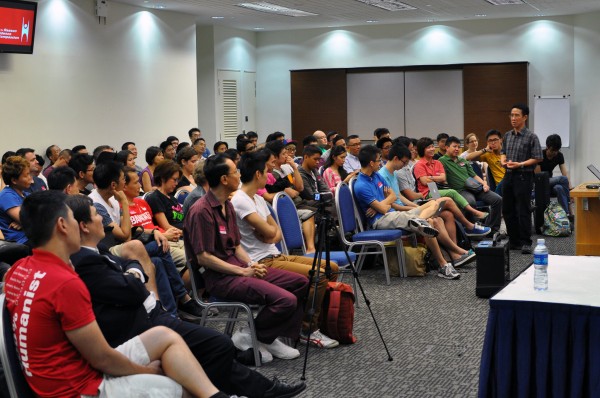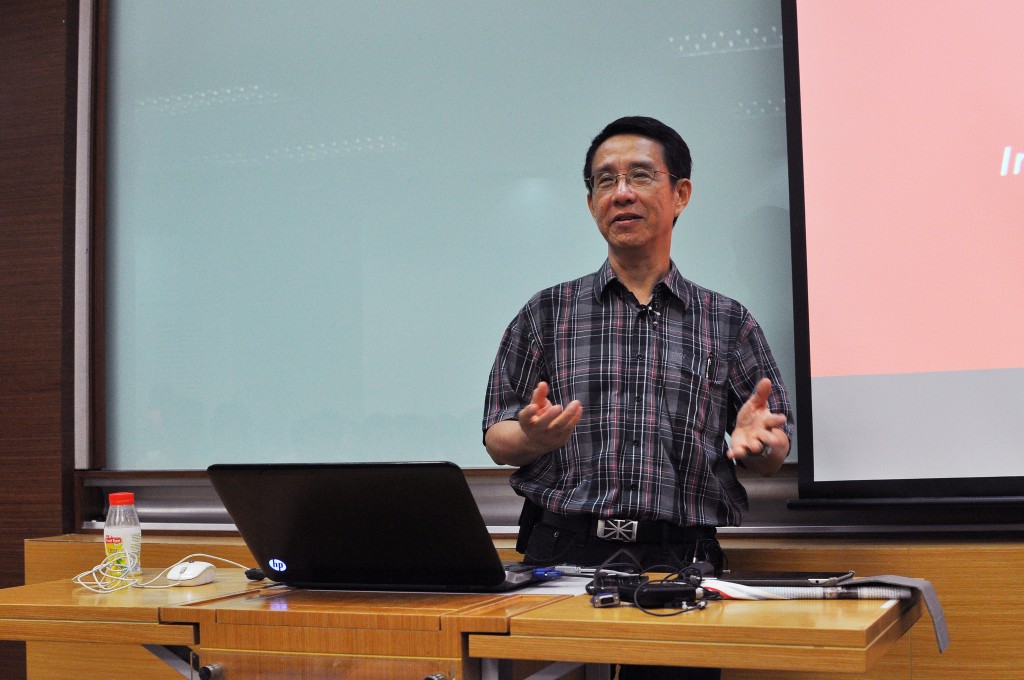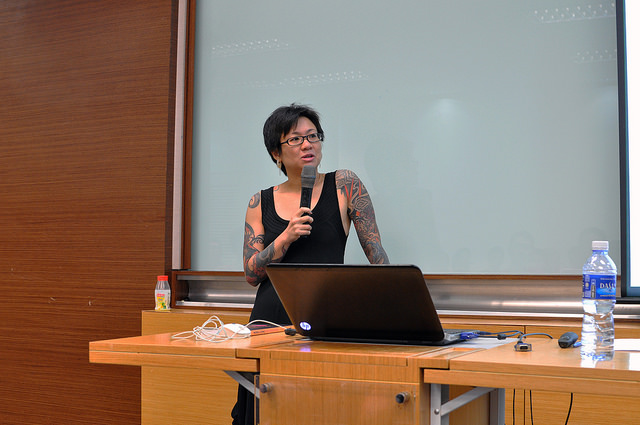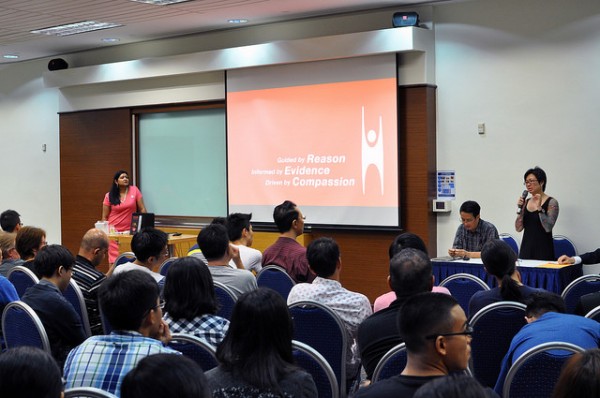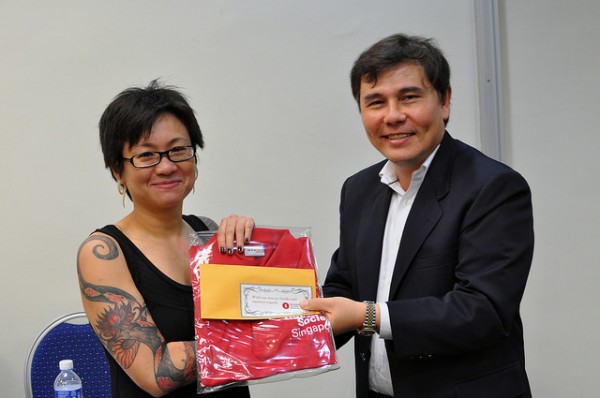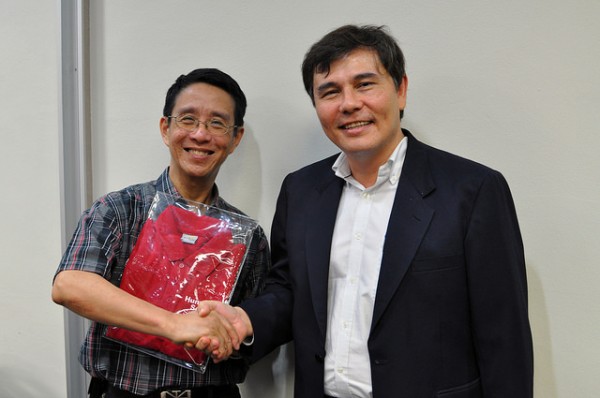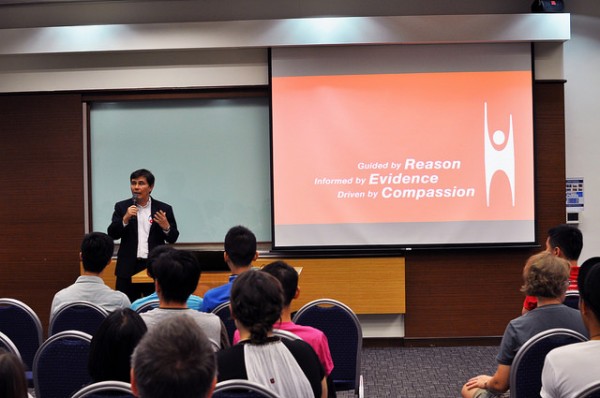By Grace Boey
On 3rd August 2014, the HSS hosted a talk — Human Worth & Dignity: Two Stories of the LGBT Community — at Singapore Management University’s Administrative Building. Guest speakers Alex Au and Professor Lynette J. Chua spoke to a full house of about 120 audience members: the biggest turnout yet for an HSS event.
HSS President Paul Tobin opened the event with a short speech. First, he shared how his 8-year-old son’s accepting attitude of same-sex marriage showed how prejudice isn’t something we are born with; it is something learned over time. Next, Tobin noted the surprisingly rich history of diverse sexuality in Asian tradition. Last, Tobin said that while the anti-LGBT have the right to their beliefs, they have no right to discriminate against those with different sexual orientations. This, he noted, is part of HSS’s charter: non-discrimination on the basis of race, class, disability, gender, sexual orientation, age, or nationality.
First speech by local blogger Alex Au
Next, prominent Yawning Bread blogger Alex Au took the floor to recount his journey over the years as a gay man and activist in Singapore. Au’s talk was a reflection on three main ideas he believed in as a young man: liberty, equality and rationality. Twenty years down the road, Au said he still believes in liberty. However, he’s no longer sure what he knows about equality, and is no longer convinced that homo sapiens are rational animals.
On rationality, Au asked: how do we move society to a better place, when human beings are fundamentally irrational? Au, interestingly, concluded he had been “wasting his time” for the past decade by presenting facts and arguments to people who would not listen. What makes a difference instead, he said, is the visibility of the LGBT community. For example, coming out has the following value: when people know of others around them who are gay it makes a “world of a difference to how they see the issue.”
On equality, Au pondered the question: what are the boundaries of equality? What kinds of rights should we extend, and to whom? Should certain employment rights, for example, be limited to locals? Taking the question even further, Au asked: what about the rights of our closest animal cousins, chimpanzees? The idea of equality in general troubled him, although he believes that LGBT individuals should have the same rights as everyone else.
The one thing Au remained certain about was liberty. The state, he believes, is only a tool for the individual to achieve liberty, happiness and personal growth; if one is treated badly, it is the state that has failed.
Second speech by Professor Lynette Chua
After a short break, Lynette J. Chua, Assistant Professor at NUS Law School, spoke about the ideas in her book Mobilizing Gay Singapore: Rights and Resistance in an Authoritarian State. Tracing and analyzing the history of the local lesbian and gay rights movement, Chua gave the audience an insight into the unique issues surrounding LG activism in Singapore.
Chua began by introducing four political norms that govern local activist mobilization. First, the mobilization must come across as being non-confrontational to the government. Second, the mobilization must emphasize the idea and intention of preserving social harmony. Third, political credibility in Singapore hinges crucially on the perception of legality; in other words, any transgression of the law (former, present or future) will cause an individual or group to lose its legitimacy. Last, the ruling political party must not perceive that their hegemony is under threat.
Next, Chua introduced what she called ‘pragmatic resistance’ — the usual strategy driving lesbian and gay mobilizations in Singapore. Pragmatic resistance involves toeing the line while simultaneously pushing boundaries. Both components, Chua noted, are important: toe the line too much and nothing changes; push the boundaries too far and find yourself in trouble.
Chua then traced the history and phases of the local LG movement, incorporating interesting anecdotes she gleaned from research and interviews with people involved. As she recounted these stories, it became clear just how much the four political norms — especially the idea of lawfulness — played a part in local LG activism.
She ended off by noting the difference between gay politics in the West and in Singapore. While challenging anti-gay discrimination on the basis of ‘rights’ is the way to go in America, that approach does not work in Singapore.
Q&A session
Wrapping up the event was a Q&A session with Au and Chua, moderated by Tobin. Audience members raised interesting questions — for example, given how the visible LGBT movement in Singapore is dominated by educated English-speaking individuals, how should one go about helping an elderly Chinese gay man? — Will bringing him to Pink Dot do any good?
Another point discussed was the recent IPS Survey on Race, Religion and Language, which included statistics on public perception of same-sex rights. In response to an audience question, Au noted that the inconsistent results on the survey potentially revealed more about respondents’ irrationality than it revealed actual public perception. Another audience member pointed out that, amongst other things, phrasing and methodology meant that the survey’s results should be taken with a pinch of salt.
After the Q&A session, audience adjourned to a reception outside the function room to mingle and share thoughts on the event.
HSS President Paul presents gifts of appreciation to our two speakers after the event:
Reflections on the event, and ‘human dignity’
I left the event with an enriched perspective on local LGBT activism. Chua’s descriptive analysis of the movement opened my eyes to many facts and issues I hadn’t known before. Au, on the other hand, raised normative questions that made me examine my personal beliefs on rights and activism.
What of ‘human dignity’, or human ‘worth’? Despite the event’s name, neither of the speakers discussed these ideas, which I’d actually come to the event to hear about. However, I still left with lots of thoughts on the matter.
As a philosopher, I am skeptical about lofty appeals to the abstract concepts of ‘human dignity’ and ‘worth’. The terms, to me, are amalgamations of several issues that are really distinct. Historically, they have also been used to mean different things. The talks managed to cover many of these different interpretations.
A common idea is that freedom from discrimination, stigma and oppression is required for someone to live a ‘dignified’ life. Tobin’s speech, in particular, reminded me that all human beings have the right to live this way. Sadly, LGBT individuals in Singapore face discrimination from both the law and society.
(Above) Our President making his opening remarks at the event
Another common interpretation of human dignity is the right to be treated with respect. Chua’s speech opened my eyes to the roundabout way in which local activism had to take. Ideas of ‘rights’ and ‘oppression’, regardless of how much they are hashed out in social discourse, are not taken seriously in arenas where they matter most. Instead, change is only effected by tip-toeing around minefields of authoritarian rule, and appeasing those who hold the key. To me, there is something quite embarrassing about a community having to dance for their freedom this way.
‘Worth’ is also commonly seen as the basis for dignity. Au’s speech reminded me of my own view on equality: that all beings ought to receive equal consideration of their interests. LGBT individuals share the same fundamental human interests with heterosexuals – such as love, relationships, and sex. To deny them such things is to ignore the value of their human interests; in essence, it is to deny part of their ‘human worth’.
Turning things around, Au’s talk also made me consider how I hope for the pro-LGBT movement to view and treat its ‘opponents’: with the same respect we would like from them. Like Au, I am resigned to the fact that most people (myself included) are irrational creatures. But I think we must guard against the increasing trend of liberals deriding conservatives for their extreme irrationality. We must also guard against viewing them as silly puppets to be manipulated for a cause. These are people too, worthy of respect. And as Kant would say, to view persons as a ‘means to an end’ would violate their dignity.
Alongside the goal of LGBT rights, I think there is another worthy goal: that of introducing, or re-introducing, fellow human to rationality. Billions of years of evolution has gifted homo sapiens with the unique faculty of reason. Wouldn’t it be a waste of human worth if we didn’t seek ways to encourage everyone to use it?
Grace Boey is a volunteer with the Humanist Society (Singapore). This is her report and thoughts on last week’s HSS event — Human Worth & Dignity: Two Stories of the LGBT Community. She has just completed her Masters in Philosophy at New York University, and is currently waiting to start work as a researcher in a local university before embarking on a PhD. Email her at graceboey@gmail.com, or visit her website at graceboey.wordpress.com.
UPDATE: You may wish to check out more pictures on our Flickr or watch the video recordings of the events in this new blog post.




